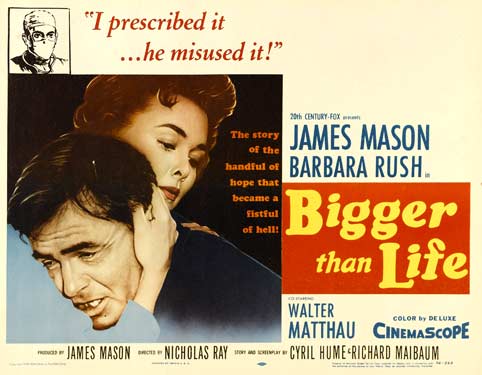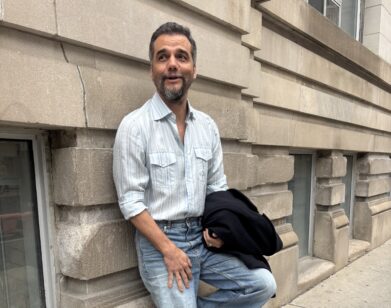Start 2009 With a Jolt

Now recovered from the holiday, embrace a film that combines family life and psychosis, the pain of domesticity and the subsequent suppression of primordial desires. Featured in a revival run at Film Forum, is Nicholas Ray’s Bigger Than Life (1956), starring James Mason as Ed, a fragile schoolteacher and caring family man with chronic physical pain. Ed’s cold and distant doctors believe the only cure is the “experimental” and dangerous drug Cortizone. (How far we’ve come!) Once Ed begins his medication, he finds that this miracle drug doesn’t just cure “an extreme inflammation of the arteries” but also does away with symptoms like insecurity, adherence to social mores, and human empathy.
It’s little surprise that this newfound freedom comes to conflict with some of the more idyllic aspects of 1950s Americana. But the film’s tale of breakdown is so dismal that it’s hard not to remain engaged. From low camera angles to restrained tracking shots, Ray’s handling of the dramas and traumas creeping under the everyday is carefully composed to fashion intensity from the quotidian. And unlike the melodramatics of similar 50s cinema (Douglas Sirk, Elia Kazan) there is an admirable subtlety here. The 50s never seemed as subtly restrictive as they do here; liberation from family life ever seemed so disastrous. Ray’s movies work in a truly emotional space, devoid of Sirk’s knowing detachment or Kazan’s condescending moral complexity.
In his memoir/self-memorialization I Was Interrupted (1993), Nicholas Ray puts his love of actors in the forefront. His films are often equal to the performances given by his actors: Bigger Than Life is no exception. James Mason produced the film, and his commitment to the project and the character is undeniable; his bold performance crystallizes lucid madness that lurks in saints and serial killers alike—in all the lucid, crazy types. Mason’s portrayal is so far beyond mere realism, that if the movie had been a success upon its original release, one would be tempted to attribute to it America’s terrific divorce rate. The supporting cast is pretty terrific as well, with Walter Matthau making an early, manly turn. Currently unavailable on DVD, this is not to be missed.
Here Ray explains himself:






